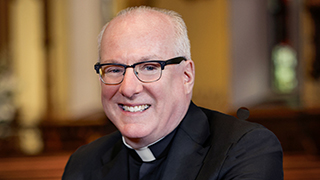Stanford Research Shows Two Seton Hall Professors in Top 2 Percent of Cited Scholars
Thursday, August 31, 2023

Professor Nicholas Snow is the Founding Endowed Professor in the Department of Chemistry and Biochemistry.
The Meta-Research Innovation Center at Stanford University (METRICS) identified two members of the Seton Hall faculty among the top 2 percent of cited scholars within their respective fields.
Both Seton Hall faculty members are from the College of Arts and Sciences: Professor Nicholas Snow is among the top 2 percent in Chemistry, Analytical and Professor Robert Mayhew is among the top 2% in Philosophy and Theology.
The database was compiled from citation analysis of over 9-million cited authors in Scopus, Elsevier's abstract and citation database, which covers nearly 36,377 titles (22,794 active titles and 13,583 inactive titles) from approximately 11,678 publishers, of which 34,346 are peer-reviewed journals in top-level subject fields: life sciences, social sciences, physical sciences and health sciences.
Journals listed in Scopus are considered to be meeting the requirement for peer review quality established by several research grant agencies for their grant recipients and by degree accreditation boards in numerous countries.
The Stanford analysis takes a comprehensive view of scholarship and its impact. Instead of simply counting publications, citations or h-index, a composite score (c-score) that includes publications, citations, co-, single, first and last authored works was generated and used to rank the authors.
Professor Nicholas Snow is the Founding Endowed Professor in the Department of Chemistry and Biochemistry at Seton Hall and Director of the University’s Center for Academic Industry Partnership. At Seton Hall for nearly 30 years, he teaches advanced undergraduate and graduate courses in analytical chemistry and separation science and is known, primarily, for his work in gas chromatography. He maintains an active research group with projects involving rapid separations of complex mixtures, multidimensional separations, sampling techniques for chromatography, gas chromatography and gas chromatography/mass spectrometry.
Professor Robert Mayhew is one of the world’s leading scholars of Aristotle and a prolific writer. He considers himself "an archaeologist of thought" and is currently collecting, translating and writing a commentary on the fragments of Aristotle’s lost Zoïka, or “animal matters,” which contained information about fish, birds and some other animals. The Zoïka scholarship follows a boom of other works he has authored recently. He was an editor of the 2022 book Clearchus of Soli: Text, Translation, and Discussion, as well as eight articles on Aristotelian philosophy, science, and literary criticism published over the past two years in several journals. His book Aristotle’s Lost Homeric Problems was published in 2019, his third book with Oxford University Press.
Mayhew has created a critical edition of a Greek text: Theophrastus: On Winds, which came out in 2018. He has also had the honor of editing and translating Aristotle: Problems for Harvard University Press’s distinguished Loeb Classical Library series.
Professor Mayhew also has an interest in the 20th century novelist-philosopher Ayn Rand. His most recent publication on Rand is the volume he co-edited Foundations of a Free Society: Reflections on Ayn Rand’s Political Philosophy (University of Pittsburgh Press, 2019).
The Stanford University METRICA database may be found here.
Categories: Education






